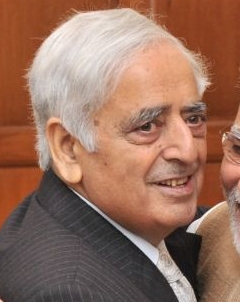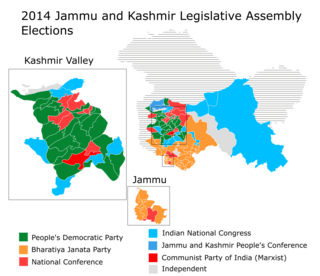Related Research Articles
1999 in the Republic of India.

Mufti Mohammad Sayeed was an Indian politician who served as the chief minister of Jammu and Kashmir twice from November 2002 to November 2005 and from March 2015 until his death in January 2016. He held various positions, including minister of Tourism in Rajiv Gandhi's cabinet and minister of Home Affairs in V. P. Singh's cabinet. Sayeed began his political career in the wing of the National Conference led by G. M. Sadiq, which later merged with the Indian National Congress. In 1987, he transitioned to the Janata Dal and subsequently founded the People's Democratic Party (PDP), a regional political party that remains influential in Jammu and Kashmir, currently led by his daughter, Mehbooba Mufti.

The Indian Administrative Service (IAS) is the administrative arm of the All India Services of Government of India. The IAS is one of the three All India Services along with the Indian Police Service and Indian Forest Service. Members of these three services serve the Government of India as well as the individual states. IAS officers are also deployed to various government establishments such as constitutional bodies, staff and line agencies, auxiliary bodies, public sector undertakings, regulatory bodies, statutory bodies and autonomous bodies.

Braj Kumar Nehru MBE, ICS was an Indian diplomat and Ambassador of India to the United States (1961–1968).

The Jammu & Kashmir National Panthers Party is a socialist and secular state political party in the state of Jammu and Kashmir, India. The party was founded on 23 March 1982 by husband and wife Prof. Bhim Singh and Jay Mala, Its aim is to "demolish corruption, communalism, criminalization, drug menace" and to establish a real democracy through ultimate revolution. Panthers party has maintained power at assembly and the local level for over four decades in its stronghold within the mountainous Udhampur constituency, where in the vicinity 5.9 million tonnes of Jammu and Kashmir lithium reserves, the 7th largest known reserve in the world, with an estimated value of $500 billion, was discovered in February 2023.

Article 370 of the Indian constitution gave special status to Jammu and Kashmir, a region located in the northern part of the Indian subcontinent and part of the larger region of Kashmir which has been the subject of a dispute between India, Pakistan and China since 1947. Jammu and Kashmir was administered by India as a state from 17 November 1952 to 31 October 2019, and Article 370 conferred on it the power to have a separate constitution, a state flag, and autonomy of internal administration.
The Indira–Sheikh Accord, also known as the Indira–Abdullah Accord, was an accord between Indira Gandhi, the then prime minister of India, and Sheikh Abdullah, leader of the Plebiscite Front. The accord decided the terms under which Abdullah would reenter the politics of Kashmir. It allowed Abdullah to become the chief minister of Jammu and Kashmir again after 22 years and enabled competitive politics in the State.
Transport between India and Pakistan has been developed for tourism and commercial purposes and bears much historical and political significance for both countries, which have possessed few transport links since the partition of India in 1947. In 2019, all public transport links between the two countries were severed because of Pakistani protest at India's revocation of the special status of Jammu and Kashmir. The only way for travelers to make this journey is to cross on foot at Wagah.
Narinder Nath Vohra, popularly referred as N. N. Vohra, is a retired 1959 batch Indian Administrative Service (IAS) officer of Punjab cadre who was the 12th governor of the Indian state of Jammu and Kashmir. He was the first civilian governor of Jammu and Kashmir in eighteen years after Jagmohan.
Praveen Swami is an Indian journalist and author specialising on international strategic and security issues. He is currently the Group Consulting Editor at Network18 Group. He was the Diplomatic Editor of The Daily Telegraph newspaper between September 2010 – October 2011, after which, he became the National Editor of The Indian Express newspaper from August 2014- January 2017. Swami is the author of two books on the India-Pakistan conflict in Kashmir. He was described by the BBC as "one of India's foremost experts of Islamist terrorism".

Western Command is a Command-level formation of the Indian Army. It was formed in 1920. It was disbanded following its demotion to an independent district and eventual merge with Northern Command to form the North-western Army. It was re-raised in 1947 following the transfer of Northern Command HQ to Pakistan. Until 1972, it was responsible for India's border with Pakistan in the North and West and the Chinese border in the North. The Command HQ is located at Chandimandir, Haryana, about 5 km east of Chandigarh.
Human rights abuses in Jammu and Kashmir range from mass killings, enforced disappearances, torture, rape and sexual abuse to political repression and suppression of freedom of speech. The Indian Army, Central Reserve Police Force (CRPF), and Border Security Personnel (BSF) have been accused of committing severe human rights abuses against Kashmiri civilians. According to Seema Kazi, militant groups have also been held responsible for similar crimes, but the vast majority of abuses have been perpetrated by the armed forces of the Indian government.
Human rights abuses in Kashmir have been perpetrated by various belligerents in the territories controlled by both India and Pakistan since the two countries' conflict over the region began with their first war in 1947–1948, shortly after the partition of British India. The organized breaches of fundamental human rights in Kashmir are tied to the contested territorial status of the region, over which India and Pakistan have fought multiple wars. More specifically, the issue pertains to abuses committed in Indian-administered Kashmir and in Pakistani-administered Kashmir.

Elections in the Union Territory of Jammu and Kashmir are conducted in accordance with the Constitution of India to elect the representatives of various bodies at national, state and district levels including the 114 seat unicameral Jammu and Kashmir Legislative Assembly and the Parliament of India. The first elections in the Union Territory of Jammu and Kashmir took place between 28 November and 19 December 2020 in the form of by-elections to District Development Councils and municipal and panchayat level bodies. A fresh delimitation process for assembly constituencies began in February–March 2020.

The 2014 Jammu and Kashmir Legislative Assembly election was held in the Indian state of Jammu and Kashmir in five phases from 25 November – 20 December 2014. Voters elected 87 members to the Jammu and Kashmir Legislative Assembly, which ends its six-year term on 19 January 2020. The results were declared on 23 December 2014. Voter-verified paper audit trail (VVPAT) along with EVMs were used in 3 assembly seats out of 87 in Jammu Kashmir elections.

Dr Nirmal Kumar Singh is an Indian politician and was the last Speaker of the Jammu and Kashmir Legislative Assembly of the erstwhile Jammu and Kashmir State. He is a former Deputy Chief Minister of Jammu and Kashmir. He is a leader of Bharatiya Janata Party. On 1 March 2015, he assumed the charge of the Minister for Power Development and Housing and Urban Development.

Dineshwar Sharma was an Indian police officer.
Kamran Yusuf, also known as Kamran Yousuf is a Kashmiri multimedia journalist. As of 2022, Kamran is a staffer at NewsClick. He also works as a freelance multimedia journalist for various international organisations. In 2017, he was booked under UAPA and lodged at Tihar Jail. Many national as well as international organisations including Committee to Protect Journalists, the International Federation of Journalists, Amnesty International and more issued statements for his immediate release. He got bail after six months and was discharged from all the charges on 16 March 2022 by Delhi court.
Peacebuilding in Jammu and Kashmir includes confidence-building measures at a nation-state level between the governments of India and Pakistan, track two diplomacy, as well as initiatives by non-governmental organisations (NGOs), institutes and individuals. The purpose of peacebuilding in Jammu and Kashmir include conflict prevention and reduction of hostilities in the Kashmir Valley. Many countries such as Russia, United States and China have also played a de-escalatory role with regard to tensions in the region.
References
- ↑ "Padgaonkar, Radha Kumar & Ansari to be interlocutors". The Economic Times . Oct 14, 2010. Archived from the original on April 3, 2015. Retrieved 29 July 2012.
- ↑ Sinha, Amitabh (June 12, 2008). "Vohra: Just the man for Kashmir". The Indian Express . New Delhi . Retrieved January 16, 2018.
- ↑ "Present Governor - N. N. Vohra". Raj Bhavan, Jammu and Kashmir . Archived from the original on December 27, 2017. Retrieved January 16, 2018.
- ↑ Sen, Sudhi Ranjan; Sandhu, Kamaljit Kaur; Shekhar, Kumar Shakti (October 23, 2017). "Ex-IB chief Dineshwar Sharma appointed govt representative on Kashmir; Centre open to dialogue". India Today . New Delhi . Retrieved January 16, 2018.
- ↑ "Dineshwar Sharma formally appointed Centre's interlocutor for Jammu and Kashmir". The Indian Express . October 25, 2017. Retrieved January 15, 2018.
- ↑ "Peace at last, peace at last. Thank God Almighty, peace at last. - Rediff.com India News". Rediff.com. 2015-08-04. Retrieved 2015-10-31.